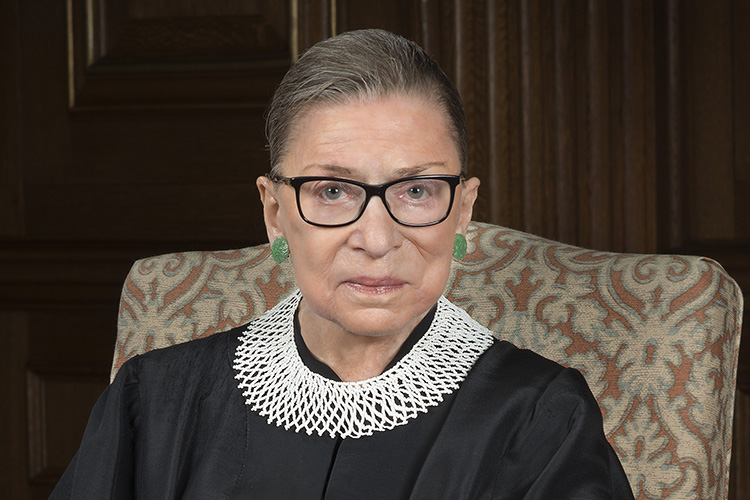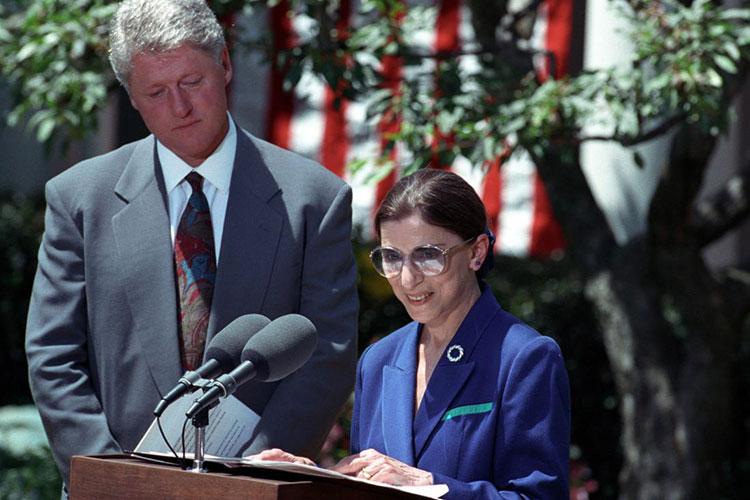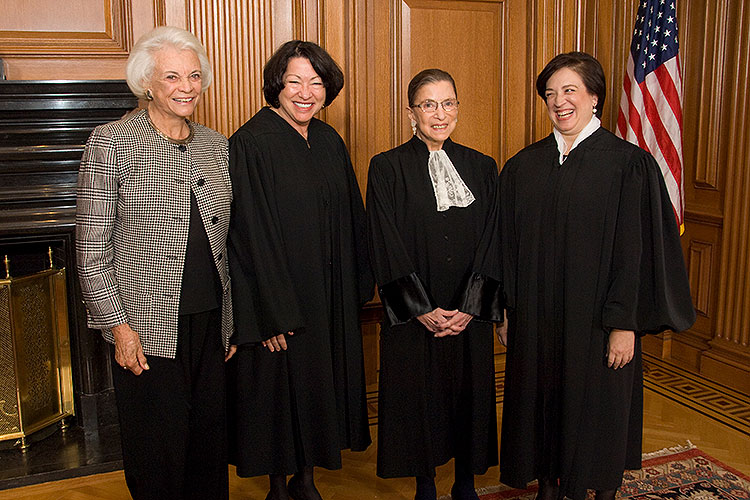UC Berkeley community mourns death of Ruth Bader Ginsburg
Faculty, students, alums reflect on the iconic U.S. Supreme Court justice's vision, commitment to equality under the law
September 18, 2020

Supreme Court Justice Ruth Bader Ginsburg (Photo courtesy of the Supreme Court of the United States)
The death on Friday of Justice Ruth Bader Ginsburg, the second woman appointed to the U.S. Supreme Court and a pioneering advocate for women’s rights, prompted heartfelt reaction at UC Berkeley, where Ginsburg gave a lecture at a packed Zellerbach Hall just last fall.
The Supreme Court announced her death, which occurred at her home in Washington, D.C., where she was surrounded by family; the cause was complications from metastatic cancer of the pancreas. Chief Justice John Roberts praised her as “a justice of historic stature.” She was 87.
Ginsburg gave the inaugural Herma Hill Kay Memorial Lecture at Berkeley on Oct. 21, 2019, receiving standing ovations before and after the event. Chancellor Carol Christ, in introducing Ginsburg, called her “the first justice in history who is widely, publicly known by just initials.”
Affectionately called “RBG,” also the name of a 2018 documentary that focused on her life and career, Ginsburg achieved rock star status among a new generation, with young women considering her a heroine of power, authority and dignity.
Among her fans was Jessica Williams, a third-year student at Berkeley Law — where 66% of the students are women — who is co-editor-in-chief of the Berkeley Journal of Gender, Law & Justice and senior diversity editor of the California Law Review. Williams was in the audience at Zellerbach last year.
“Ruth Bader Ginsburg made it possible for so many women to see themselves on the bench,” said Williams, who graduates next spring. “Losing her when we are so far from nine (women justices on the Supreme Court, a dream of Ginsburg’s) — in a year when it has become glaringly obvious our civil rights need fierce advocates — is deflating. She would want us to keep going. So, we will.”
Of attending the Berkeley lecture where Ginsburg spoke to a rapt audience, she said, “I feel so lucky to have been able to breathe her same air. She was a lion, and made girls see themselves in places we weren’t invited to be, even those who weren’t in law.”
Erwin Chemerinsky, dean of Berkeley Law, said, “All of us who were there had the chance to observe her compassion and her commitment to justice. Ruth Bader Ginsburg was a model for us in how to use the law to make our society better. As a professor, an advocate, a court of appeals judge and a Supreme Court justice, she worked tirelessly to improve people’s lives through the law.” He also wrote an op-ed in Friday’s Los Angeles Times, “Democrats have a secret weapon to thwart a rapid Ginsburg replacement. They should use it.”
Geeta Anand, interim dean at the Graduate School of Journalism, also was moved to write about Ginsburg. She reflected, in a letter on Saturday to the Berkeley Journalism community, on the inspiration that journalists can draw from Ginsburg’s life.
Third-year law student Simone Lieban Levine said she and her family in Bethesda, Maryland, were preparing their dinner table Friday evening for a Shabbat meal, at the start of Rosh Hashanah, when her mother got a news alert on her phone about Ginsburg’s death and screamed, “No!” and shared what had happened. Levine also noted that Ginsburg was the first Jewish woman to serve on the Supreme Court.
Levine, who is co-leader for Berkeley Law’s Reproductive Justice Project and for the Berkeley Law chapter of If/When/How: Lawyering for Reproductive Justice, said she will never forget the excitement of seeing Ginsburg in person at Berkeley Law before the memorial lecture.
“She was walking through the law school, and … I was right in the way for her to walk past me,” she said. “Several huge body guards came in with her, and we were frozen in place. She was so tiny in stature, but so impressive as a human being. She walked toward us, and I said, ‘Hi, Justice Ginsburg. Thank you for coming today,’ and she said, ‘Hi,’ and I immediately melted and called my family.”

Ruth Bader Ginsburg, then a judge on the U.S. Court of Appeals for the District of Columbia, accepts her nomination to the United States Supreme Court in 1993 while President Bill Clinton looks on. (Photo courtesy of the White House)
Levine, who plans to attend the vigil for Ginsburg in D.C. on Saturday with her cousin, recalled lining up for an hour and a half before the Zellerbach event and sitting in the front row, where she said she felt “in the presence of greatness.”
She added that Ginsburg “fought tirelessly for women’s rights. That’s all I want to do with my career, and I have discovered during law school that my specific path is reproductive justice. I love that she said, ‘Fight for the things that you care about, but do it in a way that will lead others to join you.’ One of my goals in leading these student groups is to inspire more students to learn about and fight for reproductive and bodily autonomy and to help create a generation of reproductive justice lawyers.”
Also in the front row at the lecture last October was Ivey Dyson, a third-year student at Berkeley Law, a member of the Womxn of Color Collective and president of the International Law Society at Berkeley.
“She was so small, but so powerful,” Dyson echoed, adding that she was struck by Ginsburg’s advice to law students about “finding balance and not worrying so much about grades, but to value learning for the sake of learning.”
Dyson said she already had considered Ginsburg a role model in high school, but then, at Berkeley Law, “reading cases in constitutional law really solidified how she fought and changed the conversation about women’s rights in the law and equality, generally. She helped men on the court understand inequality in a way that they might not have. It was really important to see someone hold her own on the court for so long and never waver from her values.”
She said she also has a favorite quote from Ginsburg, one made in response to those who’d ask the justice when there will be enough women on the Supreme Court: “When there are nine,” Ginsburg would say.
Amanda Tyler, the Shannon C. Turner Professor of Law at Berkeley Law, co-wrote a forthcoming book with Ginsburg called In Conversation with RBG: Pursuing Gender Equality Through Her Life and Work. She clerked for Ginsburg from 1999 to 2000.
“She was my idol,” Tyler said of Ginsburg, in a tribute on the Berkeley Law website. “How many people get to say that they worked for their idol?”
“She was a profoundly dedicated public servant, in no small measure because she appreciated just how important her role was to ensuring that our Constitution belongs to everyone,” Tyler wrote. “Whether as an advocate or a Justice, she tirelessly fought discrimination and more generally to open opportunities for every person to live up to their full human potential. … That is pretty special. She made our country better.”

A 2010 portrait of the only four women to have served on the U.S. Supreme Court. From left: Sandra Day O’Connor (retired), Justice Sonia Sotomayor, Justice Ruth Bader Ginsburg and Justice Elena Kagan. (Photo courtesy of the U.S. Supreme Court.)
Ginsburg so moved third-year Berkeley Law student Ashley Johnson, a research assistant to Tyler, that she had “I dissent” tattooed onto her wrist before she began law school. Johnson said she wanted the tattoo as a reminder of how Ginsburg “changed the face of society for girls, women and humanity, in general,” by dissenting, by challenging the status quo with her commitment to equality and human rights.
Clothilde Hewlett, executive director of the California Alumni Association and a Berkeley Law alumna, called Ginsburg “a Good Trouble patriot. Her unwavering commitment to ‘equal justice under law’ has left an indelible mark in our country’s history and hearts. She left the doors open for generations of women to study and practice law. We will miss her wit and compassion.”
Berkeley Law student Emma Blake, co-president of Womxn of Berkeley Law and a senior member of the Ecology Law Quarterly, called Ginsburg’s death “a tragic loss for our nation, at a time when we’ve already suffered so much loss, and I’m devastated about it.”
The passing of Ginsburg is expected to set in motion, amid a presidential campaign, a difficult political fight over her successor.
Born the same year that Ginsburg was appointed to the Supreme Court, Blake said she’s “never questioned that I can strive for any —and every— position in the legal field. We have her to thank for that. We have her to thank for eliminating gender discrimination and advancing gender equality in ways that were unfathomable to everyone but her.”
“It’s because of her vision that I am where I am today, and I know many of my friends feel similarly,” said Blake. “She motivated a generation of womxn lawyers to carry forward her legacy of equality and justice for all.”
Said Johnson, “I am a law student and aspiring civil rights lawyer because she forged the path for me to be able to do so. I hope we all continue to fight for equality in her name — I know I will. May her memory be a revolution.”